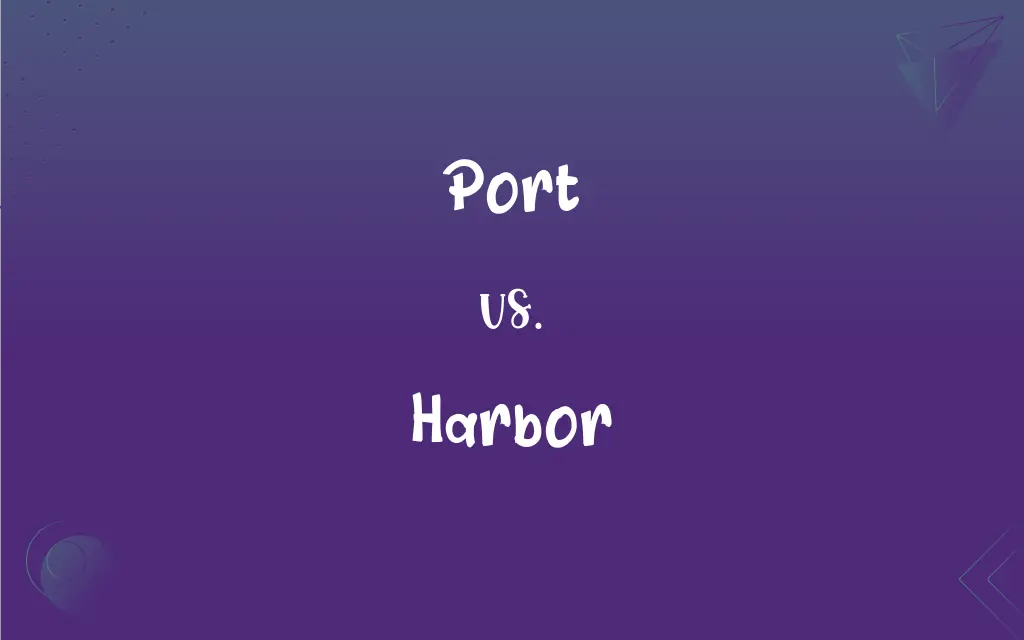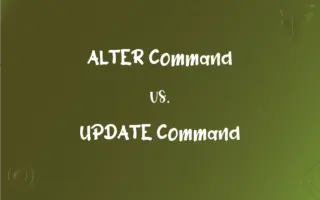Port vs. Harbor: What's the Difference?
Edited by Aimie Carlson || By Janet White || Published on February 29, 2024
A port is a facility for loading and unloading vessels; a harbor is a body of water providing shelter for ships.

Key Differences
A port is a man-made facility equipped for handling ships and cargo, often including docks, warehouses, and cranes. A harbor, in contrast, is a natural or artificially improved body of water where ships anchor and are protected from storms.
Ports are commercial hubs facilitating import and export activities, equipped with infrastructure for maritime logistics. Harbors provide safe anchorage and are often part of a larger port complex, but not all harbors have port facilities.
Ports serve as points of connectivity for maritime transport, linking sea and land transportation. Harbors primarily offer a natural or enhanced safe haven for vessels, regardless of commercial activities.
Major global cities are often associated with their ports, which are central to trade and commerce. Harbors are valued for their natural protection and can be found along coastlines, providing shelter without necessarily having port facilities.
Ports are characterized by their role in global supply chains, facilitating the movement of goods and passengers. Harbors, while they may be part of a port, are primarily recognized for their geographical feature as safe moorings.
ADVERTISEMENT
Comparison Chart
Primary Function
Facilitate maritime trade and logistics
Provide shelter and safe anchorage for ships
Nature
Man-made infrastructure
Natural or artificially enhanced body of water
Role in Transportation
Connect sea and land transport
Serve as safe moorings, not necessarily linked to transport
Commercial Activity
High, with facilities for cargo and passengers
Varies, not all harbors are commercial
Global Significance
Central to trade and economy
Valued for geographical protection
ADVERTISEMENT
Port and Harbor Definitions
Port
A port is a facility on the coast for loading and unloading ships.
The city's economy thrived thanks to its busy port.
Harbor
A harbor is a sheltered body of water where ships anchor.
The small fishing boats returned to the safety of the harbor.
Port
Ports often have passenger terminals for ferries and cruise ships.
Tourists flocked to the port to board the luxury cruise liner.
Harbor
Harbors can be natural or artificially made to protect from rough seas.
The town's artificial harbor provides calm waters for local vessels.
Port
A port includes docks, warehouses, and terminals for handling goods.
The new port features state-of-the-art cargo handling facilities.
Harbor
A harbor is often a focal point for coastal communities.
The harbor was a picturesque spot, popular with tourists and locals alike.
Port
Ports are hubs for maritime commerce and transportation.
The port was bustling with cargo ships from around the world.
Harbor
Harbors may be part of a larger port complex.
The city's harbor is adjacent to its major commercial port.
Port
A port is integral to a country's import and export activities.
The port plays a vital role in the nation's trade network.
Harbor
Harbors offer anchorage and sometimes facilities for small boats.
The harbor's mooring buoys were occupied by yachts and sailboats.
Port
A place on a waterway with facilities for loading and unloading ships.
Harbor
A sheltered part of a body of water deep enough to provide anchorage for ships.
Port
A city or town on a waterway with such facilities.
Harbor
A place of shelter; a refuge.
FAQs
Can a port exist without a harbor?
Technically yes, but most ports are located in or near harbors for protection.
What activities occur at a port?
Shipping, receiving cargo, passenger transit, and maritime logistics.
What is a harbor?
A sheltered area of water where ships can anchor safely.
Do ports handle passenger travel?
Yes, many ports have terminals for ferries and cruise ships.
How do ports impact the economy?
They are crucial for import/export and contribute significantly to the economy.
How are harbors protected?
Through breakwaters, jetties, and sometimes artificial enhancements.
What is a port?
A facility for loading, unloading, and handling ships and cargo.
Are all harbors ports?
Not all harbors are ports; some are just natural shelters without facilities.
Are harbors always natural?
Harbors can be natural or artificially enhanced for better protection.
Can harbors facilitate trade?
While harbors provide shelter, trade activities are typically handled in ports.
Are harbors important for fishing communities?
Yes, they provide a safe haven for fishing boats.
Is there a difference in the size of ports and harbors?
Yes, ports are often larger due to extensive facilities; harbor sizes can vary.
What is the main purpose of a harbor?
To provide a safe anchorage and shelter for vessels.
What infrastructure is common in ports?
Docks, cranes, warehouses, and terminals.
What is a dry port?
A terminal away from the coast, connecting inland areas with maritime transport.
What types of ships use harbors?
All types, from small boats to large vessels seeking shelter.
Are ports always near the ocean?
Mostly, but there are inland ports on rivers and lakes too.
Do ports have security measures?
Yes, ports have security protocols for cargo and passenger safety.
Can a harbor be used for recreation?
Yes, many harbors are popular for recreational activities like boating.
Do all major cities have ports?
Most coastal cities have ports, but not all inland cities do.
About Author
Written by
Janet WhiteJanet White has been an esteemed writer and blogger for Difference Wiki. Holding a Master's degree in Science and Medical Journalism from the prestigious Boston University, she has consistently demonstrated her expertise and passion for her field. When she's not immersed in her work, Janet relishes her time exercising, delving into a good book, and cherishing moments with friends and family.
Edited by
Aimie CarlsonAimie Carlson, holding a master's degree in English literature, is a fervent English language enthusiast. She lends her writing talents to Difference Wiki, a prominent website that specializes in comparisons, offering readers insightful analyses that both captivate and inform.







































































